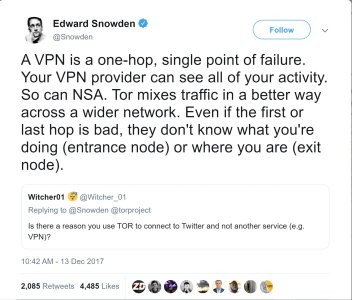twoaussies said:
As mentioned above, the Brave browser is the way to go. Mostly I would suggest dumping Microsoft and going with Linux. The Mint Cinnamon is easy to install and use, seriously, if I can do it so can you, almost the same as Windows 10 and Bill's not listening.
Linux is great, and has made great strides in the last ten years for the average desktop user.
That being said - linux has some problems that IMO makes it not a viable desktop operating system for your "average" PC users. Keep in mind, this is coming from someone who was once RedHat linux certified, SCO certified and I have at any moment at least 4 machines running linux and several servers.
- You still have to drop to a command line to do things that are just a few clicks in windows. Most
people aren't comfortable doing this.
- Some distros still haven't fixed the wireless network device issues with really common models.
- The "app stores" usually packaged with linux distros is a mess. Many come with multiple "app stores"
and only confuses and frustrates the average user.
- Certain types of devices (convertible laptops, touchscreen devices, and multiple monitor setups) can
be unsupported or difficult to configure in certain distros.
- Software support, same problem as MacOS. Some people require MS Office or other software that
only runs on Windows. For example- I require at least a couple windows machines for stuff like MS
Teams, Photoshop (yes I know there is Gimp, but it isn't as good,) Office (OpenOffice is good, but
still has issues for certain usages and types,) and Gaming. Linux is making good progress as a gaming
OS but it still is nowhere near where Windows is for the majority of games/performance.
It has been my experience that 90% of people who switch to Linux are always super excited and happy with it for the first several weeks - then the issues above start manifesting and by the second month they are back in windows. I find that only people who use a computer for very basic tasks (basically internet browsing) end up keeping it a while.
There are ways to make Windows less "talky" to it's home base. Several good utilities and guides to do so. Search for "disable windows telemetry" for tons of good guides to do so.
Linux does however have some benefits :
- Certain distros are made to run on older hardware. You can make that older computer in the corner
usable in with a lightweight linux distro.
- It is more "private" than Windows (of course this completely depends on what the user installs and
what services they use..
- Linux is free, and open source.
- There is usually really good support on internet forums, and active userbases depending on the
distro if you have issues.
- There are hundreds of distros to choose from. Ones aimed at the "average user" like popOS, Mint,
Ubuntu, Manjaro, etc and ones even aimed at security (Kali) or privacy (Qubes, Tails, etc.)
And the best IMO part of linux is the "live" USB options. You can make a bootable USB thumb drive and the OS will run off of it. This is super handy if you are interested in trying linux but do not want to risk your Windows install. On a more recent computer, with fast USB ports (2.0+) it is completely usable. I carry a bootable linux drive with me, so if I have to use a "public" PC I can just pop it in, boot off it - and I have my own configured OS and I don't have to worry about any security risks from shared PCs.

